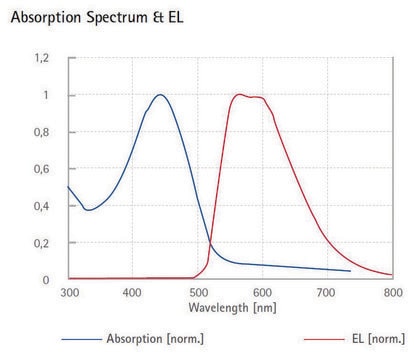541443
Poly[2-methoxy-5-(2-ethylhexyloxy)-1,4-phenylenevinylene]
average Mn 40,000-70,000
Synonym(s):
MEH-PPV
About This Item
Recommended Products
description
Band gap: 2.3 eV
Quality Level
mol wt
average Mn 40,000-70,000
fluorescence
λex 493 nm; λem 554 nm in toluene
Orbital energy
HOMO -5.3 eV
LUMO -3 eV
OLED Device Performance
ITO/PEDOT:PSS/MEH-PPV/Al
ITO/PEDOT:PSS/MEH-PPV/PBO/Al
ITO/PEDOT:PSS/MEH-PPV/PBZT/Al
OPV Device Performance
ITO/MEH-PPV/BBL/Al
ITO/MEH-PPV:PC61BM(1:4)/Ca
Mw/Mn
~6
storage temp.
2-8°C
SMILES string
O(CC(CCCC)CC)c1cc(c(cc1)OC)C=C
InChI
1S/C17H26O2/c1-5-8-9-14(6-2)13-19-16-10-11-17(18-4)15(7-3)12-16/h7,10-12,14H,3,5-6,8-9,13H2,1-2,4H3
Related Categories
General description
Application
Filter before application.
Storage Class Code
11 - Combustible Solids
WGK
WGK 3
Flash Point(F)
Not applicable
Flash Point(C)
Not applicable
Personal Protective Equipment
Choose from one of the most recent versions:
Already Own This Product?
Find documentation for the products that you have recently purchased in the Document Library.
Our team of scientists has experience in all areas of research including Life Science, Material Science, Chemical Synthesis, Chromatography, Analytical and many others.
Contact Technical Service![Poly[2-methoxy-5-(2-ethylhexyloxy)-1,4-phenylenevinylene] average Mn 70,000-100,000](/deepweb/assets/sigmaaldrich/product/structures/344/488/b8f8179d-3970-4deb-a754-adda88cdb36f/640/b8f8179d-3970-4deb-a754-adda88cdb36f.png)
![Poly[(p-phenylenevinylene)-alt-(2-methoxy-5-(2-ethylhexyloxy)-p-phenylenevinylene)]](/deepweb/assets/sigmaaldrich/product/structures/147/963/61b421da-530b-4acf-8851-ecb9492e90ba/640/61b421da-530b-4acf-8851-ecb9492e90ba.png)


![Poly[(m-phenylenevinylene)-co-(2,5-dioctoxy-p-phenylenevinylene)] light-emitting polymer, predominantly trans](/deepweb/assets/sigmaaldrich/product/structures/249/040/9442b889-4fa0-4b4a-b424-cff0769a5ef2/640/9442b889-4fa0-4b4a-b424-cff0769a5ef2.png)




